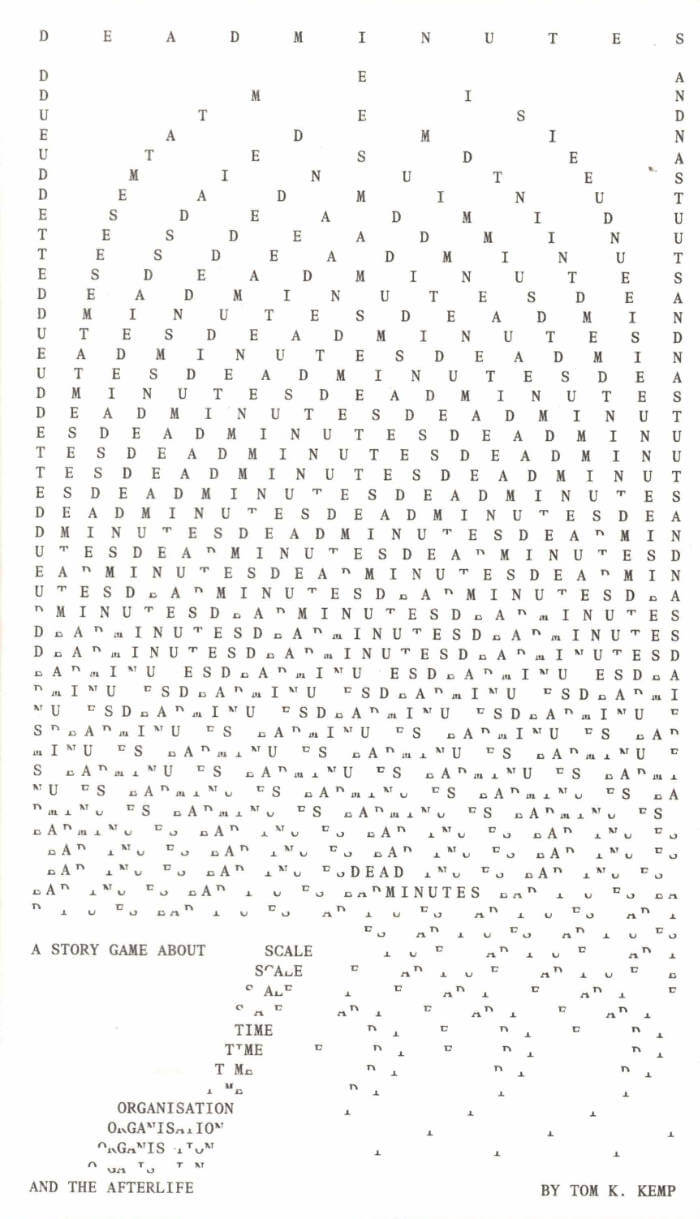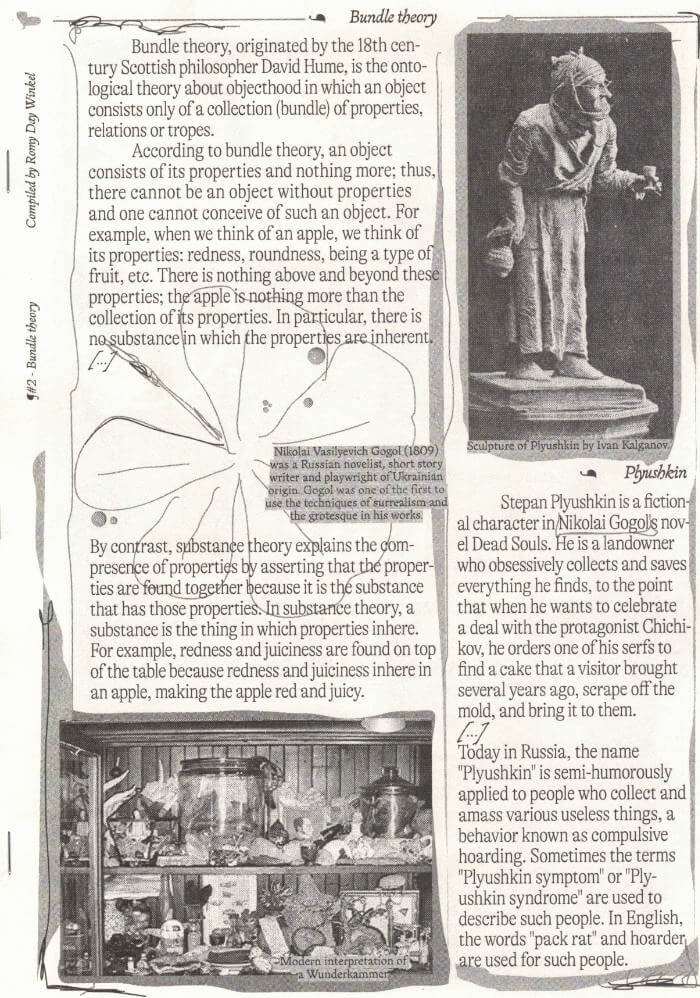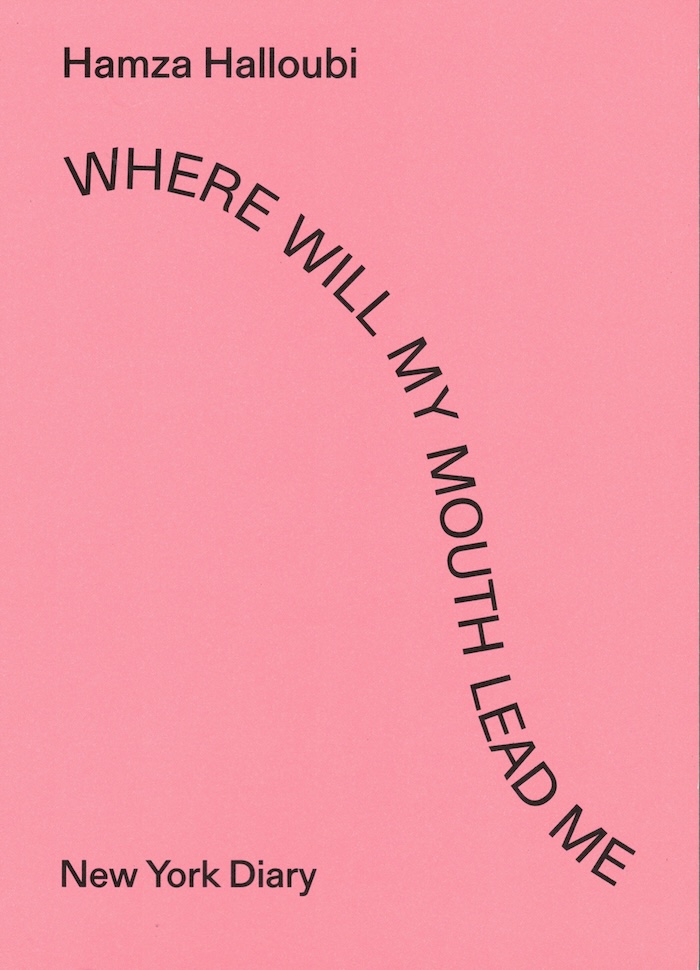
Romance Utopia
Romance Utopia is a research project is both a digital archive, a radioshow, a videowork and a collection of essays around notions of romance.
Language: English

Romance Utopia is a research project is both a digital archive, a radioshow, a videowork and a collection of essays around notions of romance.
Language: English

A series of choreopoems by Eric Peter. Published at the occasion of 'Assemblages of Intimacy' a group exhibition in a Tale of a Tub, Rotterdam in 2018.

Dead Minutes is a storytelling game about systemic change in an undesirable afterlife. You, the players, will decide what this hell, underworld or land of the dead is like, what its problems are, how change happens there, and what the complications might be when altering something so big, involving so many dead people, over so much time. It’s a game about impossible seeming actions at impossible seeming scales, making difficult choices, and dealing with unexpected outcomes.
The first half of this book gives you everything you need to play a session of Dead Minutes, which takes 2-5 hours with 3-6 people.
The second half features an essay by Patricia Reed that expands on the concepts of heuristic fictions and vital zombies in relation to the afterlife, and a series of afterlife generating 'seeds' contributed by different types of writers - a demonic boardroom presentation by writer and art critic Habib William Kherbek, a ritual from horror game designer Samuel Clarice Mui Shen Ern, a premise by Arthur C Clarke award winning author Chris Beckett, and a letter from Selma Selman.

Child’s Replay is a hallucinatory homecoming. As we follow THE CHILD in a series of private re-enactments, the present self is revealed as the past’s fragile construction. Pursuing the banality of trauma, a first-person character juxtaposes childhood events with internal misrepresentations, reflections on the emotional toll of migration, psychoanalytic theory, Brazilian history, and literary criticism. An exploration of the impact that language and fiction have on real bodies, Child’s Replay assembles a hybrid portrait of memory and anti-memory.
This publication is limited to 100 copies, which are signed and numbered by the author.

In Perpetuity is part of Ivey Wawn’s project of the same name. With contributions from those involved in the making of what would have been the live performance, it is an accumulation of thoughts, reflections and associated pieces of work that give some idea of what the work could, would, or may in the future come to be.
In Perpetuity is an ongoing project that has taken a variety of forms, from publication, through video and into live performance.

Produced in conjunction with the exhibition that took place at Maison Pelgrims (10/9-23/10/2021), the book presents original interventions by the artists of the rosa rosae rosae project : Alicia Jeannin, Alicja Melzacka, Angela Detanico & Rafael Lain, Annaïk Lou Pitteloud, Audrey Cottin, buren, Charlie Usher, Eleanor Ivory Weber, Eva Giolo, Henry Andersen, Jan Vercruysse, Maíra Dietrich, Marc Buchy, Maxime Jean-Baptiste, Niels Poiz, Oriol Vilanova, Sabir (Lucie Guien, Amélie Derlon Cordina, Sophie Sénécaut / Perrine Estienne, Kevin Senant, Maud Marique, Pauline Allié, Carole Louis), Slow Reading Club, Sofia Caesar, Surya Ibrahim, Yiannis Papadopoulos, Yoann Van Parys
Edited by Pauline Hatzigeorgiou / SB34
Graphic design by Tipode Office
The book was produced with the support of Fédération Wallonie-Bruxelles (aide à l'édition) and Région Bruxelles-Capitale (Image de Bruxelles)

For #2 in the ¶ (Pilcrow)-series Romy Day Winkel has approached collecting, or hoarding, as an aesthetic of patience. Through her selection of Wikipedia-articles she looks at what happens when objects, magical or otherwise, are all put together. If it is impossible, and perhaps even uninteresting, to know when a collection or archive is finished, how does one start to hoard impatiently
¶#2 consists solely of texts and images found on the online collaborative platform Wikipedia. ¶#2 is assembled by Romy Day Winkel, designed by Tjobo Kho and Wouter Stroet, edited by Jan-Pieter ‘t Hart and published by OUTLINE.

Responses to Untitled (eye with comet) (c.1985) by Paul Thek is the sixth and final anthology in a series that gathered responses to works of art made during a period of the ongoing AIDS Crisis, from the identification of the virus in 1981 to the introduction of life-saving drugs in 1996.
In this sixth iteration, responses were sought to the painting Untitled (eye with comet) by Paul Thek. The work was found in his storage after his death from AIDS in 1988.
List of contributors in order of appearance:
E.R. De Siqueira
Ben Estes
João Motta Guedes
Lucy Swan
Jon Rainford
Louis Shankar
Amy Evans Bauer
Hattie Morrison
Sammy Paloma
AN Grace
James Horton
Nick Wood
Sophie Paul
Jae Vail
Elizabeth Zvonar
Lars Meijer
Clay AD
Michel Kessler
Pablo Miguel Martínez
Emma Harris
Dylan McNulty-Holmes
Kitya Mark
Katherine Franco
Ainslie Templeton
Alistair McCartney
John Brooks
Jesse Howarth
jimmy cooper
Felix Pilgrim
Nicholas Chittenden Morgan
Murphy O’Neir
Rachel Cattle
Isabel Nolan
Susan Finlay
Ted Simonds
Brooke Palmieri
Kate Morgan
Ashleigh A. Allen
Diogo Gama
JP Seabright
Hugo Hagger
Amanda Kraley
Brendan Cook
Matt Bailey
Charlotte Flint
Rodney Schreiner
Lucy Price
Morgan Melhuish
Jordan Weitzman
Jaakko Pallasvuo
Alex Fiorentino
Harald Smart
Marguerite Carson
loll jung
Richard Porter
Nicholas Kalinoski
Hedi El Kholti
Edmund Francis English
Ted Bonin

The artist's travel diary in New York.
Where will my mouth lead me? This question arises already in the first days of Hamza Halloubi's residency in New York. It characterises his diary entries from August to November 2024. He observes the art world, comments on cultural and political events and thinks about writers and artists who have long intrigued him and what his body and their ideas are doing in this city–and what this city does not do to him and them: David Hammons, Edward Saïd, Mohamed Choukri, Félix González-Torres… How they also appear like ghosts in his work. Hamza Halloubi approaches the viewer of his visual work, and here also the reader, as a social and political presence. In addition to his diary and image fragments from his films and exhibitions, this pocket book also includes two interviews with the artist.
Hamza Halloubi (born 1982 in Tangier, Morocco, lives and works between Brussels, Tangier, and Amsterdam) is a multi-disciplinary artist with a focus on video and painting.